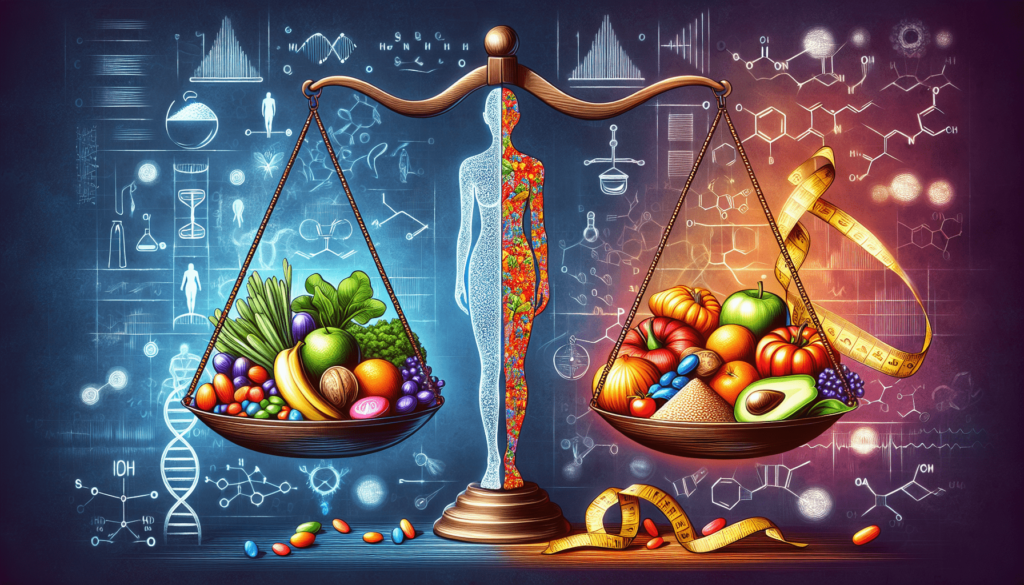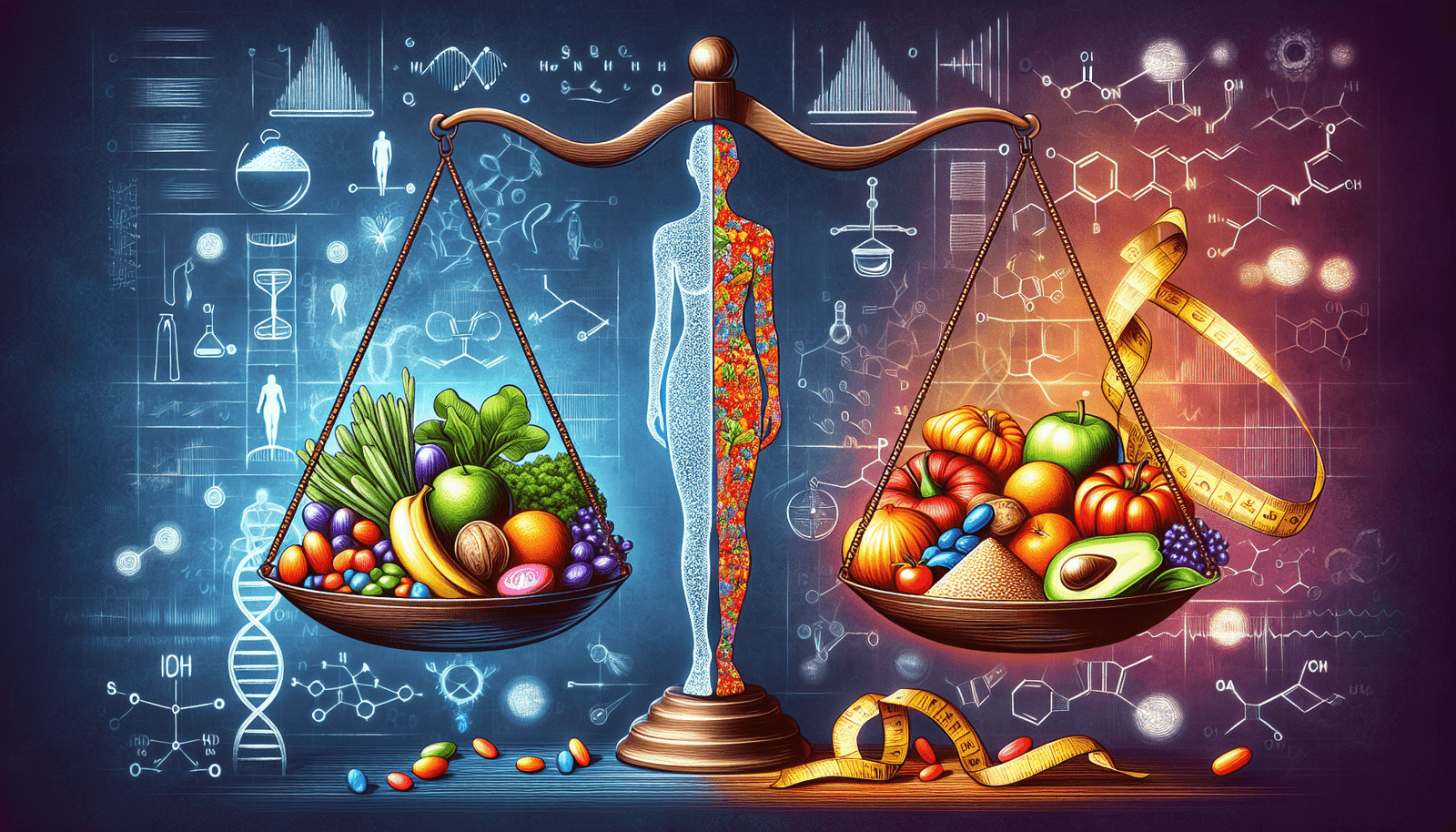Are you struggling to manage your weight and looking for effective solutions? In a world where obesity rates are rising, the quest for maintaining a healthy weight has become more important than ever. Perhaps you’ve heard about nutraceuticals and their potential role in weight management. This article aims to shed light on the subject, exploring the possibility of nutraceuticals as a helpful tool in achieving your weight management goals. So, if you’re curious about whether or not nutraceuticals can make a difference in your weight management journey, read on to discover more.
Understanding Nutraceuticals
What are nutraceuticals?
Nutraceuticals are a category of products that are derived from food sources and have additional health benefits beyond basic nutrition. These products are typically taken in the form of supplements and are designed to promote health and well-being. Nutraceuticals can contain a variety of substances such as vitamins, minerals, herbs, enzymes, and probiotics.
How do nutraceuticals differ from pharmaceuticals?
The main difference between nutraceuticals and pharmaceuticals lies in their classification and intended use. Nutraceuticals are considered dietary supplements and are regulated differently from pharmaceutical drugs. They are not intended to treat, cure, or prevent diseases like pharmaceuticals. Instead, nutraceuticals are meant to complement a healthy lifestyle and support overall wellness.
Types of nutraceuticals
There are several types of nutraceuticals available on the market, each with its own unique benefits and uses. Some common types of nutraceuticals include antioxidants, omega-3 fatty acids, probiotics, and herbal extracts. These nutraceuticals can be found in various forms such as capsules, powders, liquids, and bars.
Weight Management Challenges
What are the common challenges in weight management?
Weight management can be a challenging process for many individuals. Some common challenges include difficulty in controlling portion sizes, lack of motivation to exercise regularly, emotional eating, and a sedentary lifestyle. Additionally, genetic factors, hormonal imbalances, and medical conditions can also make it harder for some people to manage their weight effectively.
Why is weight management important?
Maintaining a healthy weight is crucial for overall well-being and reducing the risk of various health conditions. Excess weight can increase the likelihood of developing conditions such as heart disease, type 2 diabetes, high blood pressure, and certain types of cancer. Weight management not only improves physical health but also contributes to mental and emotional well-being.
The role of diet and exercise in weight management
Diet and exercise play key roles in weight management. A balanced diet that includes a variety of nutrient-dense foods can provide necessary nutrients while helping to maintain a calorie deficit for weight loss. Regular physical activity not only burns calories but also boosts metabolism and builds lean muscle mass, which aids in weight management.

Nutraceuticals for Weight Management
The potential benefits of nutraceuticals in weight management
Nutraceuticals can potentially offer several benefits when incorporated into a weight management plan. Some nutraceuticals are believed to increase metabolism, suppress appetite, or block the absorption of fat. Others may assist in maintaining stable blood sugar levels or reducing inflammation, which can contribute to weight gain. However, it is important to note that nutraceuticals should not be solely relied upon for weight loss and should be used in conjunction with a healthy diet and exercise regimen.
Do nutraceuticals actually help with weight loss?
While some studies have suggested that certain nutraceuticals may have a positive impact on weight management, more research is needed to fully understand their effectiveness. It is important to approach nutraceuticals as a supplement rather than a magic solution for weight loss. Nutraceuticals should be used in combination with other healthy habits to achieve sustainable and long-term weight management goals.
The science behind nutraceuticals and weight management
The science behind nutraceuticals and weight management is complex and not yet fully understood. Many nutraceuticals affect various metabolic processes in the body, such as energy regulation, fat metabolism, and appetite control. However, individual responses to nutraceuticals can vary, and their effectiveness may depend on factors such as genetics, lifestyle, and overall health. Further research is needed to determine the specific mechanisms through which nutraceuticals may impact weight management.
Popular Nutraceuticals for Weight Management
Green Tea Extract
Green tea extract is a popular nutraceutical that is believed to aid in weight management. It contains antioxidants called catechins, which have been shown to increase metabolism and promote fat oxidation. Additionally, green tea extract may help suppress appetite and reduce the absorption of dietary fat.
Garcinia Cambogia
Garcinia Cambogia is another nutraceutical commonly used for weight management. The active ingredient in Garcinia Cambogia is hydroxycitric acid (HCA), which is believed to inhibit an enzyme involved in fat synthesis. It has also been suggested that Garcinia Cambogia may help suppress appetite and increase serotonin levels, potentially reducing emotional eating.
Conjugated Linoleic Acid (CLA)
Conjugated Linoleic Acid (CLA) is a fatty acid found in products such as meat and dairy, but it can also be taken as a nutraceutical supplement. CLA is believed to help reduce body fat and increase lean body mass. It may also have anti-inflammatory properties and support cardiovascular health.
Chromium Picolinate
Chromium Picolinate is a mineral supplement that is often marketed for its potential weight management benefits. It is thought to improve insulin sensitivity, which can help regulate blood sugar levels and reduce cravings for carbohydrates and sugar.
Caffeine
Caffeine is a stimulant that is commonly found in various beverages and nutraceutical products. It is believed to increase metabolism and enhance fat burning. However, it is important to consume caffeine in moderation and be aware of its potential side effects, such as increased heart rate and jitteriness.

Evaluating the Effectiveness of Nutraceuticals
Understanding clinical studies on nutraceuticals and weight management
To evaluate the effectiveness of nutraceuticals, it is important to look at well-designed clinical studies. These studies involve randomized controlled trials with a large sample size and a control group for comparison. They assess various endpoints such as weight loss, body composition, and changes in metabolic parameters. By examining the results of these studies, one can better understand the potential benefits and limitations of nutraceuticals for weight management.
Factors to consider when evaluating the effectiveness of nutraceuticals
When evaluating the effectiveness of nutraceuticals, it is important to consider several factors. These include the quality and transparency of the research conducted, the dosage and formulation of the nutraceuticals used, the duration of the studies, and the characteristics of the study population. Additionally, individual factors such as genetics, lifestyle, and adherence to a healthy diet and exercise routine can also influence the effectiveness of nutraceuticals.
Potential side effects and risks of nutraceuticals
While nutraceuticals are generally considered safe when used as directed, they can still carry potential side effects and risks. Some nutraceuticals may interact with medications or existing health conditions. For example, herbal extracts may interfere with blood clotting or hormone levels. It is important to consult with a healthcare professional before starting any new nutraceutical regimen to ensure safety and minimize potential risks.
Role of Nutraceuticals in a Comprehensive Weight Management Plan
Combining nutraceuticals with a balanced diet
Nutraceuticals should not be seen as a replacement for a balanced diet but rather as a complementary component of a comprehensive weight management plan. A balanced diet that includes whole foods, plenty of fruits and vegetables, lean proteins, and healthy fats is essential for providing essential nutrients and supporting overall health. Nutraceuticals can be used to fill potential gaps in nutrient intake or to target specific aspects of weight management.
The importance of exercise in conjunction with nutraceuticals
Exercise is a crucial component of a successful weight management plan. Regular physical activity not only helps burn calories and promote fat loss but also improves cardiovascular health, boosts mood, and increases overall strength and endurance. When combined with suitable nutraceuticals, exercise can enhance the effectiveness of weight management efforts and contribute to long-term success.
Seeking professional advice for safe and effective weight management
Before incorporating nutraceuticals into a weight management plan, it is essential to seek professional advice from a healthcare provider or a registered dietitian. These professionals can assess individual needs, provide personalized recommendations, and monitor progress. They can also help identify potential interactions or contraindications between nutraceuticals and medications or existing health conditions.
Regulatory Considerations for Nutraceuticals
How are nutraceuticals regulated?
Nutraceuticals are regulated as dietary supplements in many countries, including the United States. In the U.S., the Food and Drug Administration (FDA) regulates the labeling and manufacturing practices of dietary supplements. However, the FDA does not approve or evaluate the safety or effectiveness of these products before they are marketed. It is crucial to choose reputable nutraceutical brands that follow good manufacturing practices and provide transparent labeling.
The difference between dietary supplements and nutraceuticals
While the terms “nutraceuticals” and “dietary supplements” are often used interchangeably, they are not exactly the same. Nutraceuticals are a subgroup of dietary supplements that have additional health benefits beyond basic nutrition. Dietary supplements encompass a wider range of products that can include vitamins, minerals, herbal extracts, protein powders, and other substances aimed at supplementing one’s diet.
Ensuring safety and quality of nutraceutical products
To ensure the safety and quality of nutraceutical products, it is important to choose reputable brands that abide by good manufacturing practices. Look for certifications such as NSF International or the United States Pharmacopeia (USP) verification. These certifications indicate that the product has undergone testing for purity, potency, and quality. Additionally, it is advisable to consult with a healthcare professional before starting any new nutraceutical regimen to ensure they are suitable for individual needs and goals.
Personalized Nutraceutical Solutions
The potential of personalized nutraceuticals for weight management
The field of personalized nutrition is rapidly advancing, and there is growing potential for personalized nutraceutical solutions in weight management. By taking into account an individual’s unique genetic profile and specific health needs, personalized nutraceuticals can be tailored to provide optimal support for weight management goals. This approach holds promise for more effective and targeted interventions in the future.
The role of genetic testing and personalized nutrition
Genetic testing can provide valuable insights into an individual’s genetic makeup and how it may influence weight management. By identifying specific genetic variations related to metabolism, appetite, and nutrient absorption, personalized nutrition plans can be created. These plans may include nutraceutical recommendations that are more likely to align with an individual’s genetic profile, increasing the potential for successful weight management outcomes.
Tailoring nutraceuticals to individual needs and goals
Tailoring nutraceuticals to individual needs and goals is a key aspect of personalized weight management plans. Nutraceuticals can be selected based on factors such as nutrient deficiencies, specific health concerns, or genetic predispositions. This personalized approach takes into account individual variations and maximizes the potential benefits of nutraceuticals for weight management.
Realistic Expectations and Sustainable Weight Management
Setting realistic goals for weight management with nutraceuticals
When incorporating nutraceuticals into a weight management plan, it is essential to set realistic goals. Expecting drastic or rapid weight loss solely from nutraceuticals is not realistic or sustainable. Weight management requires a holistic approach that includes healthy eating, regular exercise, and lifestyle modifications. Nutraceuticals can support these efforts by providing additional nutrients or targeting specific aspects of weight management.
The importance of sustainable lifestyle changes
Sustainable lifestyle changes are vital for successful weight management. Nutraceuticals should be viewed as a tool to aid in these changes, not as a quick fix. It is crucial to establish healthy habits that can be maintained in the long term, such as mindful eating, regular physical activity, stress management, and adequate sleep. By combining these lifestyle changes with the use of nutraceuticals, individuals can achieve more sustainable weight management outcomes.
Maintaining weight loss with nutraceutical support
Maintaining weight loss can be challenging, even with the support of nutraceuticals. Nutraceuticals can continue to play a role in weight maintenance by providing essential nutrients, supporting metabolic health, or aiding in appetite control. However, it is important to remember that ongoing commitment to a healthy lifestyle, including balanced nutrition and regular exercise, is crucial for maintaining long-term weight loss.
Consulting a Healthcare Professional
The importance of consulting with a healthcare professional before starting nutraceuticals
Before starting any new nutraceutical regimen, it is crucial to consult with a healthcare professional. They can assess individual health status, identify potential contraindications, and provide personalized guidance tailored to specific needs and goals. A healthcare professional can also monitor progress and make adjustments as necessary to ensure safe and effective weight management.
Getting personalized guidance for weight management
A healthcare professional, such as a doctor or registered dietitian, can provide personalized guidance for weight management. They can take into account factors such as overall health, underlying medical conditions, medications, and lifestyle factors. With this information, they can make recommendations regarding nutraceuticals, diet, exercise, and other lifestyle changes to support weight management goals.
Avoiding potential interactions or contraindications
Consulting a healthcare professional is essential to avoid potential interactions or contraindications between nutraceuticals and other medications or health conditions. Some nutraceuticals may interact with certain medications, such as blood thinners or diabetes medications. A healthcare professional can provide guidance on safe and appropriate nutraceutical choices and ensure they do not interfere with any existing treatments or conditions.
In conclusion, nutraceuticals have the potential to complement a comprehensive weight management plan. While research into their effectiveness is ongoing, incorporating nutraceuticals into a healthy lifestyle that includes a balanced diet, regular exercise, and professional guidance can support sustainable weight management. It is important to approach nutraceuticals as part of a holistic approach and set realistic expectations for achieving and maintaining weight loss. Consulting with a healthcare professional is crucial to ensure safe and effective use of nutraceuticals and to address any potential interactions or contraindications. With personalized guidance and a commitment to long-term lifestyle changes, nutraceuticals can be a valuable tool in achieving and maintaining a healthy weight.
